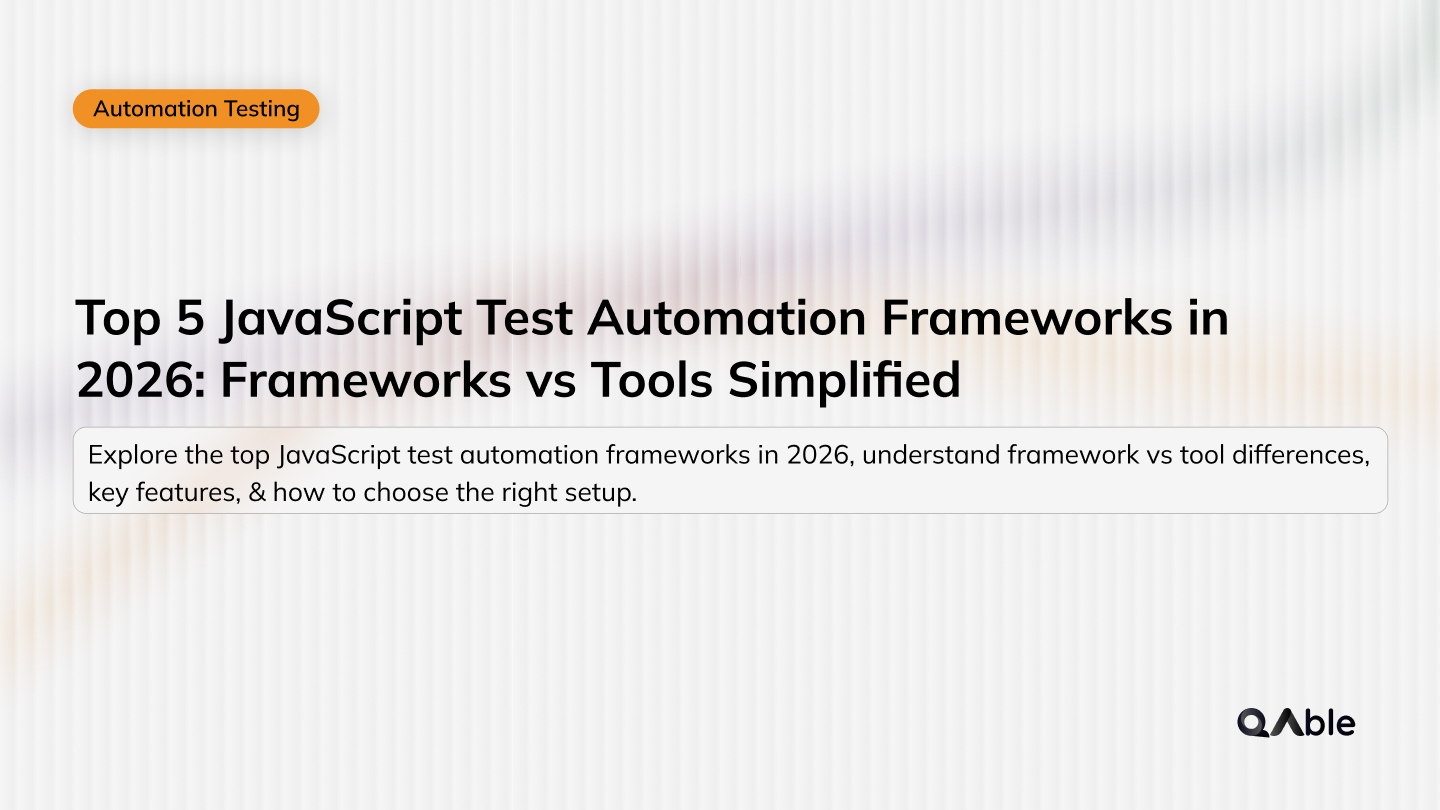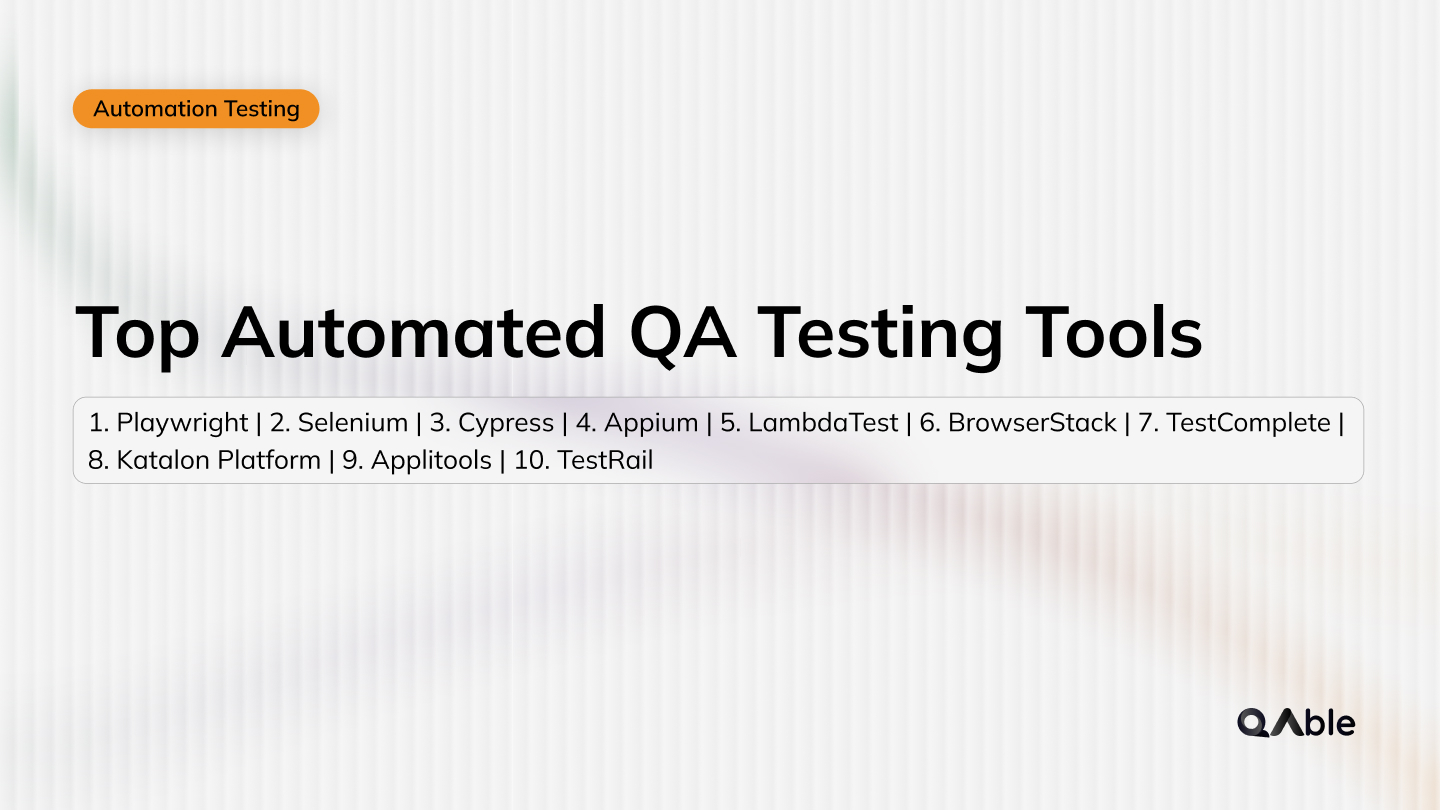Table of content
SHARE THIS ARTICLE
Is this blog hitting the mark?
Contact Us
Table of Content
- What is Generative AI?
- Generative AI in Software Testing
- Generative AI Testing Tools
- Generative AI Use Cases in Software Testing
- FAQs
Being in the software development industry, where time is crucial, it is important to pay attention to quality and reliability. There is nothing wrong with traditional ways of software testing but the problem is that they lack speed, coverage, and flexibility. This is where generative AI comes to the rescue and changes the landscape of software testing completely.
In this blog, let me share insights on generative AI, specifically how it can be used in software testing along with the different testing tools powered by generative AI and the implications of generative AI in software testing.
What is Generative AI?
Generative AI is a branch of artificial intelligence that aims to produce new items of content such as text, images, and even programmable code through learning from pre-existing data. This is different from conventional AI, which works from a fixed set of instructions based on certain patterns that have been set in advance as guidelines to follow.
This capability makes generative AI capable of mimicking the human creative chain of thought and problem-solving ability which is desirable in many domains, including software testing.
The generative models, for example, GPT (Generative Pre-trained Transformer), use deep learning approaches to analyze a large pool of data to make logical and contextually accurate responses. These models can be fine-tuned to learn structurally and perform various tasks such as parsing complex queries or generating code snippets or even writing test cases for the application.
Generative AI in Software Testing
The use of generative AI in software testing involves utilising artificial intelligence for the automation or improvement of several steps in the testing procedures. Thus, with the help of generative AI models, software testers will be able to test more quickly, as well as detect flaws more accurately.
Here are some key areas where generative AI is making a significant impact in software testing:
1. Automated Test Case Generation
It is significant to note that the process of generating test cases can be very time consuming for anybody involved in software testing. The use of generative AI can help in the assessment of the software requirements and generate detailed test cases for it. This not only accelerates the testing process but also makes it nearly impossible to overlook a potentially very important test scenario. Thus, generative AI in testing can produce numerous and complex test cases based on historical test data and user stories that are not limited to common use cases but also consider the less probable ones.
2. Test Data Generation
Creating realistic and a wide variety of test data is very important for the overall testing. Generative AI can easily create large volumes of test data that can be very realistic. It can also help evaluate how the software performs under different conditions in aspects such as speed, stability, and usage. With the assistance of generative AI, it becomes easier to detect entries that have not been considered while preparing specific test data manually.
3. Bug Detection and Diagnosis
Parameters such as code repositories, commit histories or issue tracking systems can be processed by generative AI models to find patterns and correlations indicating the presence of bugs. One of the distinct benefits of generative AI is that it can continuously scan the code and generate alerts on possible security problems. This enables the programmers as well as the testers to locate the problem areas and rectify them with ease, without consuming so much time for debugging.
4. Test Script Maintenance
As the software changes, the test scripts often prove more challenging to manage. The application of generative AI can help in the constant updating of the test scripts depending on the changes made in the code base. This way, generative AI can regulate the tests and ensure that the new changes in code do not limit the effectiveness of the tests. This not only helps to save time and effort in maintaining the tests but also guarantees that it will maintain its effectiveness.
Generative AI Testing Tools
The following approaches of generative AI testing tools have been developed to advance the application of AI in software testing. These tools utilize sophisticated algorithms in machine learning as a way of customizing different testing tasks and enhancing the efficiency of testing. Here are some popular generative AI testing tools:
1. Testim
Testim is a sophisticated AI-based testing tool that applies generative AI to generate and maintain tests automatically. It builds test cases based on facts that are derived through a machine learning technique to parse the application under test. Testim also offers self-healing, which means the test scripts are updated according to application changes on their own.
2. Functionize
Functionalize is a generative AI that can write and run tests using natural language processing. Its AI engine learns how the application works and then develops test scenarios using inputs and usage patterns. Functionize also provides extended reporting and analysis to assist testers in finding the problematic areas and the ways to solve them.
3. Applitools
By using generative AI, Applitools improves visual testing and automatically identifies differences in the visual components of the application’s versions. It can select graphical dissimilarities; in addition, it presents a report with marked distinctions. This is of great help to testers in making sure that as much as the application changes, the look and feel of the product does not change.
4. Test. ai
Functional testing of mobile and web applications is done with generative AI. It adapts to the usage patterns and interactions that users provide and creates test cases based on the patterns. Test.ai can also automatically detect bugs and generate reports to help testers find the bugs quickly and fix them.
Generative AI Use Cases in Software Testing
There are numerous ways through which generative AI can be used in software testing. Here are some notable use cases where generative AI is making a significant impact:
1. Continuous Testing in DevOps
Continuous testing is another practice that is essential in DevOps when making updates and establishing software to avoid a negative outcome. Generative AI can help in writing and running the test cases during the different phases of development and testing. This makes it easier to identify and correct problems that may be present in the software to avoid them getting to the production stage.
2. Regression Testing
A regression test helps to verify that modifications to the code did not affect the earlier tested features. With generative AI, one can develop regression test cases that are capable of running on the new code while taking into consideration previous test data. This helps reduce the time taken in regression testing while guaranteeing that no segment is left untested.
3. Performance Testing
Performance testing aims at determining how the software behaves under varying load levels. Interactive test data can be created by generative AI and numerous user scenarios can be recreated to determine the usability of the software. This enables determining areas that require optimization to enhance the improvement of application scalability.
4. Security Testing
Security testing is vital, as it helps to determine the weaknesses of the system and provide protection for the software. The generative AI can identify the coding vulnerabilities and, generate test cases that address the weaknesses. In this case, generative AI comes into handy as it can model the various ways an attacker could launch an attack thus exposing some loopholes that might not be easily noticed by other testing methods.
5. User Experience Testing
Usability testing tries to determine how people, or users, are using the software and where they are encountering issues. As mentioned above, generative AI can ‘write’ test cases that look like real users and, therefore, can identify more about how friendly the software is. This enhances the overall user experience and allows the application to meet the user requirements and expectations.
Conclusion
There is no doubt that the concept of generative AI is empowering the domain of software testing by executing and improving various tests. The advantages that generative AI brings to software testing include automated test-case creation, bug identification, and other aspects that make the testing process more effective, detailed, and comprehensive. The usage of generative AI testing tools also helps organizations increase their market window, improve the quality of the software, and decrease the cost of testing.
In light of this behavior, it is gradually finding its way into the field of software development, and as a result, software testers and developers need to embrace such development with the latest trends and guidelines. No question that adding generative AI in software testing is a necessity and not just a trending topic in the IT industry.
Lastly, it can be concluded that generative AI is set to become a significant driving force for the continuous advancement of software testing as an intelligent, efficient, and reliable process.
Discover More About QA Services
sales@qable.ioDelve deeper into the world of quality assurance (QA) services tailored to your industry needs. Have questions? We're here to listen and provide expert insights


Nishil Patel is the Co-founder of QAble, delivering advanced test automation solutions with a focus on quality and speed. He specializes in modern frameworks like Playwright, Selenium, and Appium, helping teams accelerate testing and ensure flawless application performance.
.svg)














.webp)
.webp)
.png)
.png)











.png)



.png)

.png)

.png)






.jpg)













.webp)

